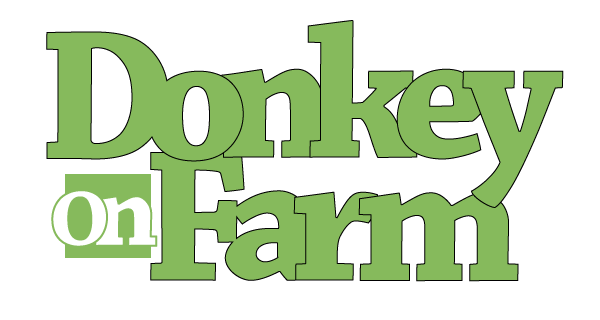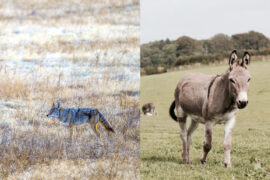Animals all behave in different ways, and their reactions usually have a meaning or a reason behind them. Biting is no exception. So why do donkeys bite each other on the neck?
Donkeys bite each other on the neck to establish dominance and tell the other herd members that they are stronger. This behavior may also just be part of playtime, as donkeys and other equines like to play fight with each other.
Understanding the natural behavior of donkeys will help owners to care for them better. So, read on to find out more about donkey biting behavior.
Why Do Donkeys Bite Other Donkeys on the Neck?
Here are the most common reasons:
Territoriality
Donkeys are prey animals, similar to horses, and they value their space. If another animal scares them or comes into their space without them expecting it, they will lash out and bite. This is to protect themselves from whatever threat might be there.
A lack of resources for the whole herd may also lead to biting as they will fight with each other to see who gets an extra bite of food or the comfiest place in the pasture.
Pain
Although donkeys play fight, they can sometimes take it too far. If two donkeys are fighting and one of them bites the other hard enough to cause pain or injury, the injured one will bite back.
Bites of retaliation can happen anywhere on the body. This includes the neck as it is one of the most vulnerable places on the body,
In another instance related to pain, an injured donkey may bite another on the neck if it looks like they are about to touch the area where they are injured. This way, the other donkey knows to back off.
Curiosity and play
Young donkeys will nip and bite other donkeys in the herd on the neck because they do not know better and are trying on exploring the world around them. They do not mean harm by it and their herd mates will use it to teach them right from wrong.
Changes in hormone levels
When a female donkey is around, male donkeys will fight with each other to impress and win over the female. This results in biting on the neck and other areas. Male donkeys can be aggressive when trying to find a mate, sometimes leaving their opponent severely injured.
Defense
Donkeys will bite other donkeys on the neck and other parts of their body as an act of self-defense if they think they are going to be threatened or injured. The same behavior is used to protect donkey foals from harm. Donkeys will always follow their instincts to protect their family.
Poor diet
Donkeys that are not getting the right nutrition may lash out and bite. Just like humans, animals can get more irritable when they are hungry. The hungrier they are, the more aggressive they will get. Donkeys will also bite to keep their food from being eaten by other donkeys
Boredom
Donkeys will bite each other on the neck as well as in other areas of the body because they are bored. They are social animals and need stimulation or enrichment to prevent boredom. If donkeys are bored for too long, the boredom may turn into aggression.
Now that you know the answer to the question, why do donkeys bite each other on the neck?, you can take the appropriate measures to prevent this behavior from happening and keep your donkeys happy and healthy.
How to Prevent Donkeys from Biting Each Other on the Neck
Here are some strategies donkey owners can use to prevent their donkeys from biting each other on the neck or at all.
Make sure they have friends
Herd animals like donkeys and other equines are social animals. Although they can live alone, it is not recommended because they thrive with other donkeys or companion animals. Making sure your donkeys have friends will keep boredom, and subsequent aggression, at bay. This reduces the chances that any donkey will bite.
Give them toys or other things to play with
Providing a donkey with toys and other enrichment like salt blocks will prevent donkeys from being bored and stimulate their senses. When a donkey is preoccupied and having a good time playing by themselves or with their friends, they will have no reason to bite.
Space out the herd
If two or more donkeys in your current herd are constantly fighting over territory and becoming aggressive, move one of these donkeys to a distant part of the current pasture or a new pasture altogether. This will reduce the aggressive episodes that include or lead to biting
Make sure there are enough resources to go around
Regardless of the size of your donkey herd, spread out the sources of food, water, and shelter throughout their pasture. Making sure there are enough resources will reduce competition among herd members and the resulting aggression and biting.
Geld aggressive male donkeys
Donkey stallions can be very aggressive and territorial, leading to biting. Unless you want to use them for breeding, have your male donkeys gelded to prevent this aggression and the biting that follows.
Remember donkeys bite each other for a reason, it is never just because they can. So, the next time you see your donkeys biting, take time to assess the situation and see why, instead of resorting to punishment immediately. Taking time to figure out why the donkeys are biting will give you time to come up with a solution and prevent it from happening again.
Conclusion
So, why do donkeys bite each other on the neck? Territoriality, pain, curiosity, self-defense, and a whole lot of other reasons. Donkeys will never bite just because they can, they are known for being gentle and calm animals. You can prevent donkeys from biting by providing them with enrichment, making sure they have enough food, water, and shelter, and separating donkeys that are constantly fighting.

![Why Do Donkeys Bite Each Other on the Neck? [There’s Always a Reason Behind It] Why-Do-Donkeys-Bite-Each-Other-on-the-Neck](https://donkeyonfarm.com/wp-content/uploads/2022/07/Why-Do-Donkeys-Bite-Each-Other-on-the-Neck.jpg)

![Do Donkeys Laugh? [Plus Why Do They Do It?] do-donkeys-laugh](https://donkeyonfarm.com/wp-content/uploads/2022/08/Why-do-donkeys-laugh-270x180.jpg)

![Do Donkeys Make Good Pets? [Plus What to Know Before You Get One] Do-Donkeys-Make-Good-Pets](https://donkeyonfarm.com/wp-content/uploads/2022/05/Do-Donkeys-Make-Good-Pets-270x180.jpg)
![Are Donkeys Dangerous to Dogs? [Plus How to Keep Your Dog Safe] Are-Donkeys-Dangerous-to-Dogs](https://donkeyonfarm.com/wp-content/uploads/2022/07/Are-Donkeys-Dangerous-to-Dogs-270x180.jpg)